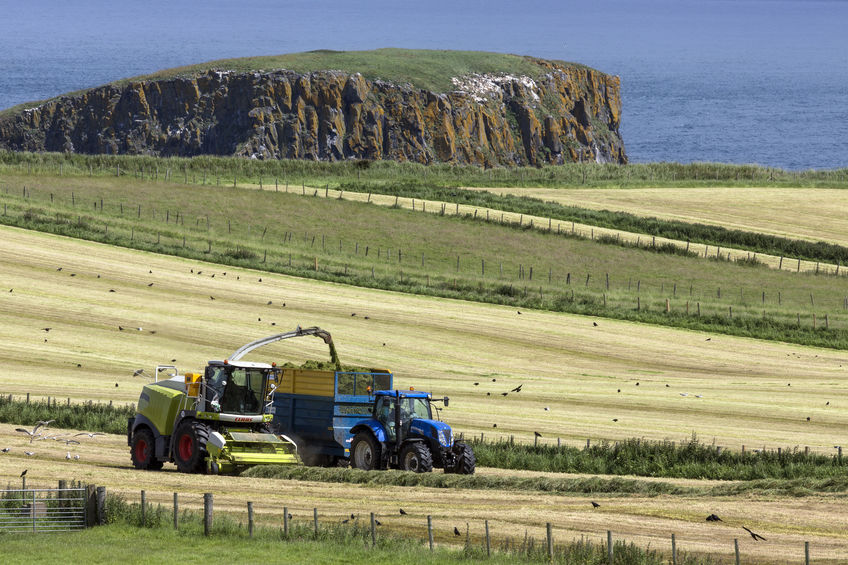
As the first-cut silage season begins, farmers are being urged to prioritise machinery maintenance and workforce safety to prevent accidents and equipment failures.
The call follows the latest statistics from the Health and Safety Executive (HSE), which reported 27 fatalities in farm-related incidents between April 2023 and March 2024.
Of these, nine deaths were attributed to transport-related incidents involving agricultural vehicles or machinery, including runovers, rollovers, and crush injuries.
An additional two fatalities were linked to machinery and PTO (power take-off) shafts.
Bob Henderson, head of engineering at NFU Mutual, highlighted the risks, saying: “Silage-making accidents, blockages and breakdowns tend to happen when people are tired, machinery is pushed too hard, or work continues in unfavourable conditions.
“It’s vital to make sure that machinery is kept well-maintained and that staff have the skills and the training to do their job safely to avoid accidents and breakdowns.”
Evita van Gestel from NFU Mutual Risk Management Services, noted that while recent weather conditions are more favourable compared to last year’s record wet winter and spring, the need for routine machinery inspections remains unchanged.
“Conditions are likely to be easier for this year’s first cut but regular maintenance checks on brakes, tyres, trailer couplings, and hydraulic pipes and brakes are just as important when the going seems easy.
“To reduce the risk of accidents it is important to make sure all drivers are trained to operate the machinery they will be using and are warned about any hazards in the fields including steep slopes, wet patches and slippery lanes.”
Before silage harvesting
Farmers are being encouraged by the rural insurer to undertake thorough checks and implement clear safety protocols, both before and during silage operations:
• Farmers should assess and manage all on-farm hazards and walk fields to identify wet patches and slippery slopes.
• Systems for maintaining contact with lone workers should be established. All new staff must be properly inducted and trained, particularly on the risks associated with farm machinery.
• Staff should be trained in the “Safe Stop” procedure: applying the handbrake fully, leaving equipment safe, stopping the engine, and removing the key before dismounting.
• Children must be kept away from operational areas.
• Trailer loads should be kept within safe limits, and all vehicles must be road legal, with fully operational brakes, lights, indicators, and flashing beacons.
• Tyres should be routinely checked for age, condition, and pressure.
• Independent inspections, such as those under the ‘Tilly Your Trailer’ scheme, are encouraged.
• Farmers are also advised to notify local residents via neighbourhood social media about silage movements to minimise road disruption and risk.
During fieldwork
• Tractors should have adequate power and braking ability, particularly on hilly or slippery ground.
• Regular inspections of mowers, tedders, forage harvesters and balers should be carried out, paying close attention to PTO shafts and safety guards.
• Engines should always be turned off and keys removed before maintenance is attempted.
• Operators must be aware of overhead power lines and the height of machinery, especially on uneven ground.
• Particular care should be taken when turning into fields, and mud on roads must be cleared promptly, with appropriate signage used to alert other road users.
• Farmers should also remain aware of public rights of way and pause operations if walkers are nearby.
• A mobile phone should be kept on one’s person at all times, not left in a vehicle. The What3Words app can aid emergency services in locating incidents.
• Taking regular breaks for food, hydration, and rest is crucial in preventing fatigue and stress.
When working on silage clamps
• NFU Mutual advises keeping all personnel away from moving vehicles and adhering to a strict filling plan.
• Sight rails should remain visible, and clamps should not be overfilled, as this heightens the risk of vehicle overturns.
• Only suitable vehicles with proper safety cabs or rollover protection structures (RoPS) and appropriate tyres should be used.
• For indoor clamps, farmers must keep clear for at least 72 hours post-filling due to the formation of dangerous nitrogen dioxide gas.
• When sheeting or removing tyres, individuals must stay at least one metre from the clamp edge and, where possible, use access equipment or tools such as poles or hooks to minimise risk.
